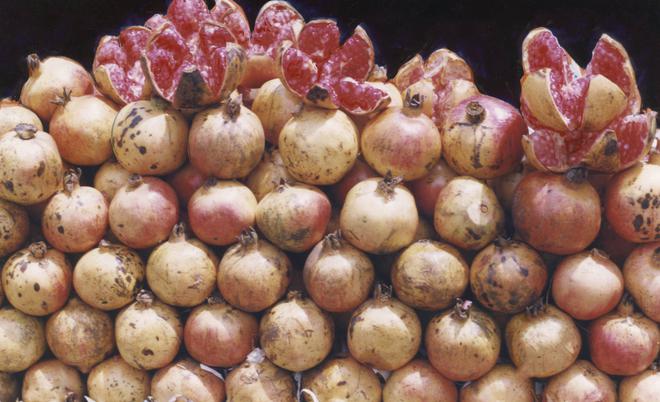It has been three years since pomegranate farmers in Karnataka have had a good crop year. Now, with incessant rains, pomegranates are being affected by blight and wilt diseases which leave the fruit with black spots and cracked surfaces, thereby reducing their quality. While some farmers in the North Karnataka region have crop insurance, new farmers in regions around Bengaluru have no protection.
Shift from grapes
In the districts of Kolar, Chikkaballapur and Bengaluru Rural, farmers removed their usual crops of grapes and other vegetables and planted pomegranates a few years ago in the hope of reaping greater profits. While this change did bear fruit for the first two to three years, 60 to 70% of these farmers have now removed these trees and gone back to other horticulture crops. The farmers reported losing over 50% of the fruits in the previous harvest.
“Farmers here got excited about pomegranate bringing in good money. Now, it seems like grape was working out far better (for them). This year, flowering is not up to mark and as it has started to rain, more flowers will fall out and fruit production will be just 20–30%. Spotted fruits will have no value in the market. Along with this, the labour costs have also increased from ₹100-250 to ₹500-600 per day. How do we bear these costs when we get nothing from selling our crop?” asks Ashwath Reddy, a farmer from Sidlaghatta taluk in Chikkaballapur.
Reduced cultivation area
Disease is also rampant in the northern belt, in districts like Belagavi and Bagalkot which are the leading producers of pomegranate in the State. According to farmers, cultivation area of the crop has come down drastically in these regions.
Krishna Patil from Bagalkot went from having 25,000 pomegranate trees spread across 85 acres to only 3 acres as of date. “In our Kaladgi region, only 10% of pomegranate farmers are left. We used to send 15-20 truckloads of fruits to Hyderabad and Kolkata during our peak years. Now, we hardly send 4-5 loads,” Mr. Patil laments.
In Bagalkot district alone, there are over a thousand farmers who cultivate pomegranates. Fruits from here used to be exported to Bangladesh too. “Everything we grow has always sold out. Such is the demand for this fruit. But now, in the time of crisis, we have been neglected,” said S. B. Angadi, deputy chairman, Bagalkot Pomegranate Growers Association.
Financial, marketing support from govt crucial
Shivaprakash Tekki, a pomegranate grower, would get 10 tonnes of the fruit from an acre. Since 2019, however, the yield has come down by at least 60%. While some problems are caused by natural factors, the farmers are also disappointed with the lack of guidance and support from the State government.
Farmers hope that Chief Minister Basavaraj Bommai recent announcement, that insurance will soon be sanctioned for all pomegranate growers, will ease their problems. “We invest lakhs of rupees on pomegranates. We need some support from the government too. Farmers are ready to pay premiums for insurance if it at least covers pesticide and fertiliser costs,” Mr. Tekki said.

Meanwhile, farmers across the state say that pesticides are not entirely helpful in preventing the diseases. They say that despite multiple sprays, the fruits can still be attacked. Due to the contagious nature of the disease, sometimes even well-guarded fields get infected if the farmers of the neighbouring fields have not taken precautionary measures. This is why S. B. Angadi suggests that while the damage due to weather cannot be controlled, the government should help farmers by creating a better market for byproducts.
“The government should set up processing plants where juice and pulp can be extracted. Deseeding machines can be employed and the seeds could be supplied to hotels and restaurants. Even though the outer surface has spots, the seeds inside will still retain quality and can be easily used,” he says. While subsidies are provided to buy these machines, the bigger problem, however, is marketing. “Farmers cannot market these products by themselves. They need support,” he adds.
However, officials at the Horticulture Department say that it is not true that the local officers do not provide guidance to the farmers. “These are regular seasonal problems. In Bagalkot, the Centre of Excellence for pomegranate and Horticulture University are there to help the farmers. The staff there, along with local officers, conduct awareness drives and provide information in advance to the farmers. Regular training programmes are also organised. Further, if farmers suffer disastrous losses, they are provided compensation. But so far, we have not been notified of any major crop loss regarding pomegranates,” says Rajender Kumar Kataria, Principal Secretary, Horticulture Department. He added that if there are any specific issues, local authorities can be alerted to conduct site visits and inspections.
Not lack of solutions, but of implementation
On the other hand, B Narayana Swamy, a retired official from Indian Institute of Horticulture Research (IIHR), says that while there are a lot of methods to postpone the infection, it is not possible to avoid it completely. However, farmers do not follow these methods completely in a systematic manner, he says.
“We have been telling for three years that an integrated way of controlling the disease is important rather than just sticking to one chemical combination. Resistance should be integrated from soil to roots to the entire crops. Farmers should follow the regular practices of cultivation including manuring and other prophylactic measures. Extra technology like neem soaps should be employed only in the end. We do not lack methods, we lack implementation” he says.







